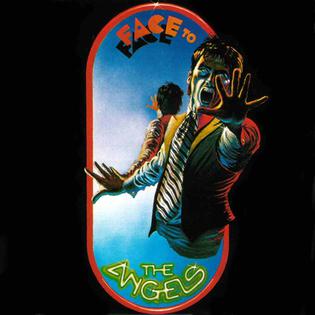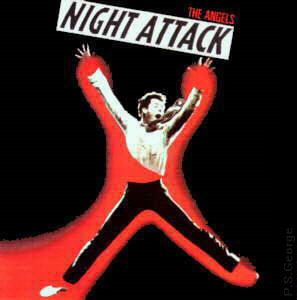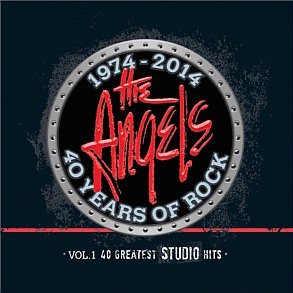Related Research Articles

The Angels are an Australian rock band that formed in 1974 in Adelaide as the Keystone Angels with Bernard "Doc" Neeson on lead vocals and bass guitar, John Brewster on rhythm guitar and backing vocals, his brother Rick Brewster on lead guitar and backing vocals, and Peter "Charlie" King on drums. In 1976, King was replaced by Graham "Buzz" Bidstrup on drums, Chris Bailey took over bass duties so Neeson could focus solely on vocals, and they changed their name to just 'the Angels'. Their studio albums that peaked in the Australian top 10 are No Exit (1979), Dark Room (1980), Night Attack (1981), Two Minute Warning (1984), Howling (1986) and Beyond Salvation (1990). Their top 20 singles are "No Secrets" (1980), "Into the Heat" (1981), "We Gotta Get out of This Place" (1987), "Am I Ever Gonna See Your Face Again", "Let the Night Roll On" and "Dogs Are Talking".

Beyond Salvation is the ninth studio album by the Australian hard rock band The Angels, produced and recorded in Memphis by Terry Manning. It was released in the US in November 1989 and in Australia in June 1990. The album peaked at No. 1 on the ARIA Albums Chart and it also peaked at number 3 on the Recorded Music NZ.

Face to Face is the second studio album by Australian hard rock band, the Angels, which was released in June 1978. It was co-produced by the band with Mark Opitz, which peaked at No. 18 on the Kent Music Report Albums Chart. For shipment of 280,000 copies, it was accredited as 4× platinum.

Night Attack is the fifth studio album by Australian band The Angels, it was released in November 1981 through Epic Records. The album peaked at No. 11 on the National albums chart. For the 1982 American release of Night Attack by Epic Records, they used the band name Angel City.

Two Minute Warning is the seventh studio album by Australian rock band The Angels, released on 28 November 1984. It was subsequently released in the United States in January 1985, under the alias Angel City. The album peaked at number 5 in Australia and number 31 in New Zealand.

Live Line is double live album by Australian hard rock band The Angels originally released in December 1987. It reached No. 3 in Australia and No.14 in New Zealand.

Bernard Patrick "Doc" Neeson OAM was an Australian singer-songwriter and musician. He was the front man for the hard rock band The Angels from its formation in February 1976 through to 1999. The band then split up and reformed in 2008 after a lengthy legal battle where Doc resumed his place as front man. For the group, Neeson was the main singer-songwriter and was the driving force behind the band being propelled into stardom for a period spanning over three decades. Their top 20 studio albums on the Australian Kent Music Report Albums Chart are Face to Face, No Exit, Dark Room, Night Attack, Watch the Red, Two Minute Warning and Howling. Their number-one album, Beyond Salvation, on the ARIA Albums Chart appeared in February 1990 and was followed by another top 20 album, Red Back Fever. The group's top 20 singles on the related Australian charts are "No Secrets" (1980), "Into the Heat" (1981), "Never so Live" (1981), "We Gotta Get out of This Place" (1987), "Am I Ever Gonna See Your Face Again", "Let the Night Roll On" (1990) and "Dogs Are Talking" (1990). On 20 October 1998, at the ARIA Awards the group were inducted into the Hall of Fame.

"Am I Ever Gonna See Your Face Again" is an Australian rock song written by Doc Neeson, John Brewster and Rick Brewster, and performed by their group, the Angels. The song was initially recorded as a ballad in March 1976 but subsequently re-released as a rock song. The song reached number 58 on the Australian charts and stayed on the charts for nineteen weeks.

The Angels Greatest is the first greatest hits album by Australian hard rock group, The Angels, released in May 1980. It peaked at No. 5 on the Kent Music Report Albums Chart. It was the group's final released on Albert Productions.

The Angels' Greatest Vol. II is the second compilation album by Australian hard rock group, the Angels, which was released in November 1985 via Epic Records. It peaked at No. 38 on the Kent Music Report Albums Chart. The album was re-released in 1998 by Shock Records as No Secrets.
"Comin' Down" is a song by Australian hard rock band The Angels, released in March 1978 as the lead single from the band's second studio album, Face to Face. The song first peaked at number 80 on the Australian Kent Music Report. It was co-written by band members, Doc Neeson, John Brewster and Rick Brewster.
"Shadow Boxer" is a song by Australian hard rock group The Angels, released in June 1979 as the lead and only single from the group's third studio album, No Exit.
"No Secrets" is a song by Australian hard rock group, the Angels, released in April 1980 from their fourth studio album, Dark Room. "No Secrets" peaked at number 8 on the Kent Music Report Singles Chart. It was co-written by band members, Graham "Buzz" Bidstrup and Bernard "Doc" Neeson. In January 2018, as part of Triple M's "Ozzest 100", the most Australian songs of all time, "No Secrets" was ranked number 50.
"Poor Baby" is a song by Australian hard rock group The Angels, released in August 1980 as the second single from their fourth studio album, Dark Room. The song peaked at number 72 on the Kent Music Report Singles Chart. The song was written by the Brewster Brothers, John and Rick Brewster.

40 Years of Rock – Vol 1: 40 Greatest Studio Hits is a three-disc greatest hits album by Australian hard rock group, the Angels, released on 2 May 2014. The album includes 40 songs from The Angels career spanning the years 1974–2014. It reached No. 20 on the ARIA Albums Chart.

Greatest Hits is a compilation album by Australian hard rock band The Angels, released in November 2011. Greatest Hits peaked at number 26 on the ARIA Charts. It was certified platinum by the Australian Recording Industry Association in 2015.

"Face the Day" is a song by Australian hard rock The Angels, released in October 1980 as the third and final single from their fourth studio album Dark Room. The single charted at number 30 on the Recorded Music NZ and number 67 on the Kent Music Report.

"Into the Heat" is a song by Australian hard rock band the Angels, released in February 1981 as a non-album single. The song peaked at number 13 on the Kent Music Report.

"Can't Take Any More" is a song by Australian hard rock band the Angels, released in April 1987 as the fourth and final single from their eighth studio album Howling. "Can't Take Any More" peaked at number 63 on the Kent Music Report.

"Finger on the Trigger" is a song by Australian hard rock band The Angels. Released as a non-album single in November 1988, it peaked at number 34 on the ARIA Charts.
References
- ↑ "Here Are The Songs That Made Triple M's 'Ozzest 100'". Musicfeeds. 27 January 2018. Retrieved 4 January 2020.
- ↑ "Take a long line to the Backstory with John Brewster". ABC Melbourne. 16 November 2018. Retrieved 19 June 2022.
- ↑ "Take a long line to the Backstory with John Brewster". ABC Melbourne. 16 November 2018. Retrieved 19 June 2022.
- ↑ Kent, David (1993). Australian Chart Book 1970–1992 . St Ives, NSW: Australian Chart Book Ltd. pp. 17–18. ISBN 0-646-11917-6. Note: Used for Australian Singles and Albums charting from 1974 until Australian Recording Industry Association (ARIA) created their own charts